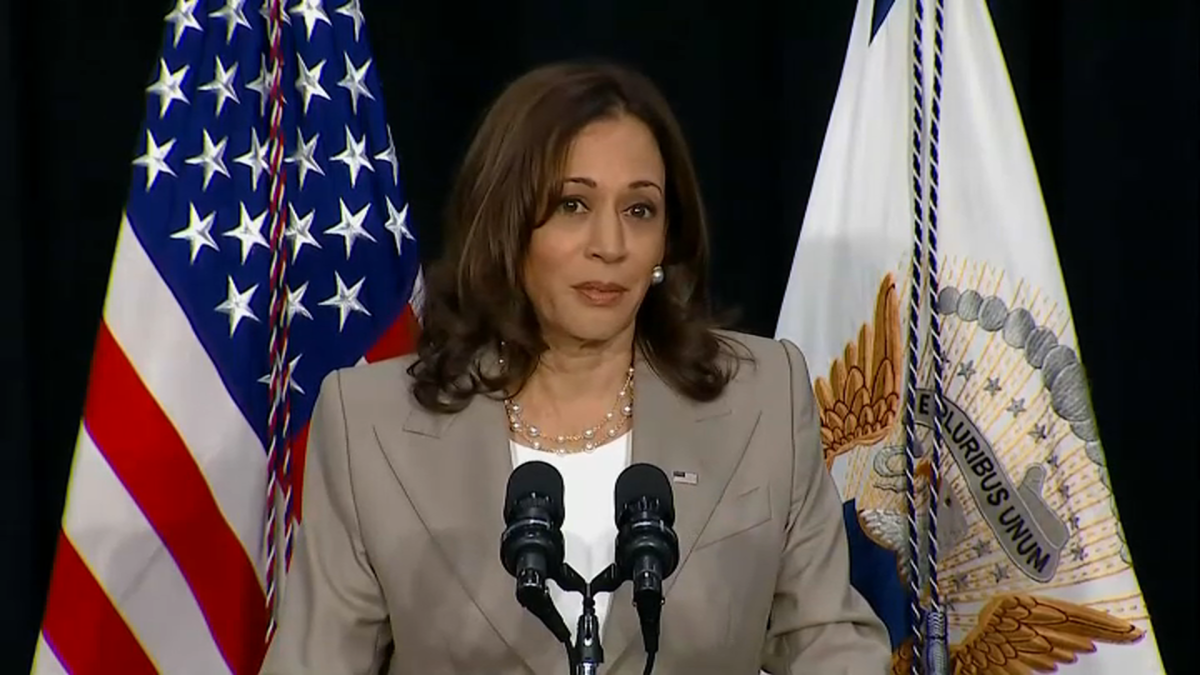
During her visit to Plainfield on Friday, Vice President Kamala Harris addressed Supreme Court decision to overturn Roe V. Wade.
On a trip to Plainfield, Illinois on Friday, Vice President Kamala Harris addressed the U.S. Supreme Court decision to overturn Roe V. Wade, a landmark decision that gave women the right to legal abortions for nearly 50 years.
"Today, as of right now, as of this minute, we can only talk about what Roe v. Wade protected. Paste tense," Harris said. "This is a health care crisis. Because understand - millions of women in America will go to bed tonight without access to the health care and reproductive care that they had this morning."
"This is the first time in the history of our nation that a constitutional right has been taken from the people of America," Harris added.
The vice president detailed how the overturning could impact Americans' right to privacy, including decisions around contraception, IUDs, the morning-after pills, in vitro fertilizations and same-sex marriage.
Feeling out of the loop? We'll catch you up on the Chicago news you need to know. Sign up for the weekly Chicago Catch-Up newsletter here.
"Today's decision...then calls into question other rights that we thought were settled. Since the right to use birth control, the right same sex marriage, the right to interracial marriage, the great aspiration of our nation has been to expand freedom, but the expansion of freedom clearly is not inevitable," Harris said. "It is not something that just happens. Not unless we defend our most fundamental principles. Not unless we elect leaders to stand up for those principles."
In her speech Friday, Harris invited the nation to "stand together" in defense of fundamental ideals and principles, including the right to privacy.
"You have the power to elect leaders who will defend or protect your rights," she said. "And as the President said earlier today with your vote, you can act. And you have the final word. So this is not over. God bless you and God bless America."
Politics
The Supreme Court's decision to overturn Roe v. Wade, ending constitutional protections for abortions, is expected to lead to abortion bans in roughly half of the U.S., as the choice now remains with the states.
The ruling came more than a month after the stunning leak of a draft opinion by Justice Samuel Alito indicating the court was prepared to take this momentous step.
In the final opinion issued Friday, Alito wrote that Roe and Planned Parenthood v. Casey, the 1992 decision that reaffirmed the right to abortion, were wrong the day they were decided and must be overturned.
Authority to regulate abortion rests with the political branches, not the courts, Alito wrote.
Joining Alito were Justices Clarence Thomas, Neil Gorsuch, Brett Kavanaugh and Amy Coney Barrett. The latter three justices are former President Donald Trump appointees. Thomas first voted to overrule Roe 30 years ago.
The ruling immediately splits the country into states with abortion access and those that outlaw it.
At least 23 states already have laws or constitutional amendments in place that would make them likely to try and ban abortion as quickly as possible, according to the Guttmacher Institute, an abortion-rights advocacy and research group.
Another half-dozen states have near-total bans or prohibitions after 6 weeks of pregnancy, before many women know they are pregnant.
Illinois has "very strong pro-reproductive rights laws," Carolyn Shapiro, professor of law and co-director of Chicago-Kent College of Law’s Institute on the Supreme Court of the United States, told NBC 5 last fall when the Supreme Court allowed a new Texas law that bans most abortions.
Illinois Gov. J.B. Pritzker signed into law in 2019 legislation expanding abortion rights across the state.
The Reproductive Health Act rescinded prohibitions on some late-term abortions and 45-year-old criminal restraints such as criminal penalties for doctors performing abortions.
The restrictions adopted after the 1973 U.S. Supreme Court decision in Roe v. Wade that legalized abortion have never been enforced in Illinois because of court injunctions.
Sponsors of the Reproductive Health Act warned at the time that its protections would be necessary should the landmark Roe v. Wade decision be overturned.
Pritzker also repealed the Parental Notification Act in 2021, allowing pregnant minors to choose whether or not a legal guardian or family member is involved in their decision. Supporters of the move said the repeal "protected the most vulnerable youth - such as victims of rape, incest, and domestic abuse – from being compelled to notify their abusers."
Following the latest news of the SCOTUS decision, Pritzker tweeted "we will fight back," additionally calling for a special session for reproductive health rights.
He called for the General Assembly to hold a special session in the coming weeks saying, "together, we are committed to taking swift action to further enshrine our commitment to reproductive health care rights and protections."
In recent years, Illinois has seen an influx of patients traveling to the state to seek reproductive care, Pritzker said.
According to data from the Illinois Department of Public Health, 7,534 nonresidents received abortions in Illinois in 2019, compared with 2,970 in 2014 and 5,528 in 2017.
"This is not an assurance that Illinois will always be a pro-choice state," Pritzker said previously. "If the wrong people are elected to office, people who are against women's rights get elected to office, if the legislature turns Republican or the governorship turns Republican, we will end up being an anti choice state."